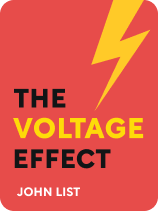

This article is an excerpt from the Shortform book guide to "The Voltage Effect" by John A. List. Shortform has the world's best summaries and analyses of books you should be reading.
Like this article? Sign up for a free trial here.
When should you give up on an idea or a project? What’s the best way to identify diminishing returns?
Sometimes it’s hard to give up, especially when you’ve invested so much and you don’t want to be a quitter. But, sometimes cutting your losses and moving on is the best course of action. In The Voltage Effect, economist John A. List explains why, sometimes, quitting is for winners.
Continue reading to learn how to avoid the sunk cost fallacy and stop wasting valuable resources.
How to Avoid the Sunk Cost Fallacy
As you scale your ideas up, List advises that you take steps to avoid succumbing to the sunk cost fallacy. The sunk cost fallacy is the human tendency to invest additional time and resources into failing projects in an attempt to salvage resources that have already been invested in the project. In these situations, you should pull out of the failing project, as doing so minimizes your losses and maximizes the time and resources you’ll be able to invest in more fruitful projects. As an economist, List offers this advice on how to avoid the sunk cost fallacy: Give up. He goes on to explain why quitting is for winners when they see the writing on the wall.
(Shortform note: While List offers separate sections on identifying diminishing returns and giving up optimally, we’ve merged them to condense the strategies for avoiding the sunk cost fallacy.)
To prioritize your best ideas, you need to recognize when an idea isn’t scaling and give up on that idea as quickly as possible. When you’re able to quickly give up on failing ideas, you minimize your losses and free up resources so that you can successfully pivot to another project.
(Shortform note: List’s recommendation to abandon struggling projects is primarily aimed at executives and other organizational leaders who are tasked with protecting and efficiently directing their organization’s resources. However, if you’re a project manager, it may be in your best interest to try to revitalize your projects, instead of giving up on them. Experts note that your reputation as a project manager is often directly tied to the success or failure of projects you manage. You can boost your reputation and increase your chances of advancement by learning to turn around floundering projects.)
When you think it might be time to give up on an idea, List recommends that you consider alternative ways you could spend your time and resources. For example, if you think it may be time to pull the plug on a specific product feature, ask yourself what else you could do with the resources currently allocated to the project. If there are other ideas or features that seem more lucrative, exciting, or scalable, it’s probably time to give up and move on.
(Shortform note: As Dobelli notes in The Art of Thinking Clearly, overcoming the sunk cost fallacy can be difficult because it inherently involves the uncomfortable task of admitting your mistakes. Instead, those who fall victim to the sunk cost fallacy continue to invest in their failing enterprises, hoping that they’ll eventually become successful, in which case their decisions would be retroactively vindicated.)
(Shortform note: If you’re not sure whether you should give up on a project, consider getting an outside perspective. In Rework, Jason Fried and David Heinemeier Hansson recommend that you ask a coworker for advice any time you’re stuck on a project for longer than two weeks. In many cases, your coworker will be able to provide fresh ideas and solutions that help you make progress. And, if it turns out that your project is irreparable, your colleague’s distance from the project will often allow them to identify the problem when you’re unable to do so yourself.)
Identify Diminishing Returns
List notes that ideas that aren’t scaling properly often suffer from diminishing returns. Diminishing returns are a phenomenon in which profit margins per unit decrease as production scales up. As we learned when discussing runaway costs, for an idea to scale successfully, cost per unit needs to decrease as the business scales.
(Shortform note: As you retool your ideas to address diminishing returns, avoid compromising on quality. In Profit First, Mike Michalowicz notes that in trying to cut costs, many entrepreneurs try to save short-term costs by lowering the quality of their goods and services. While reducing product quality can temporarily help your bottom line, in the long run, it may cause you to lose customers to competitors who provide better products.)
To identify diminishing returns, you need to interpret your data correctly. List notes that many organizations fail to identify diminishing returns because they focus on the wrong metrics—for instance, on the average profit per unit. Instead of focusing on your average profit margin, List recommends that you calculate the profit margin on the most recent unit sold. If it’s lower than your average margin, you may be experiencing diminishing returns. If this is the case, it may be time to give up.
(Shortform note: A common economic strategy for optimizing production is identifying the point of diminishing return. The point of diminishing return is the point beyond which producing additional units results in decreased cost efficiency—you can accurately estimate this using equations that take into account your production and your output. Generally, it’s most efficient to produce your product at the point of diminishing returns. Below that point, you aren’t taking full advantage of your resources, and beyond it, you’ll begin to experience diminishing returns.)

———End of Preview———
Like what you just read? Read the rest of the world's best book summary and analysis of John A. List's "The Voltage Effect" at Shortform.
Here's what you'll find in our full The Voltage Effect summary:
- How to take ideas from the small scale to the big stage
- The red flags that signal you may have trouble scaling up
- Strategies designed to increase your idea’s chances of success






